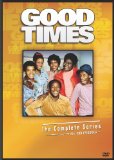| Reviews & Columns |
|
Reviews DVD TV on DVD Blu-ray 4K UHD International DVDs In Theaters Reviews by Studio Video Games Features Collector Series DVDs Easter Egg Database Interviews DVD Talk Radio Feature Articles Columns Anime Talk DVD Savant Horror DVDs The M.O.D. Squad Art House HD Talk Silent DVD
|
DVD Talk Forum |
|
|
| Resources |
|
DVD Price Search Customer Service #'s RCE Info Links |
|
Columns
|
|
|
Good Times - The Complete Series
"Let's face it, James: this family ain't Ozzie and Harriet."
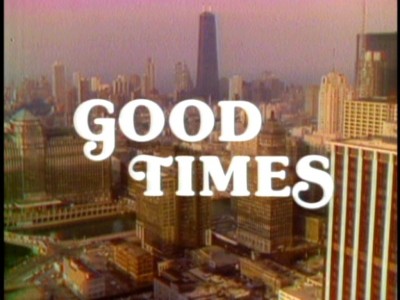
Yes, I watched all of these, too (just like Sanford and Son: The Complete Series) - and I had a pretty good time...for the most part. In another one of their irresistibly cheap, bare-bones, all-inclusive sets, Sony has gathered together Good Times: The Complete Series on 17 discs, collecting all 133 episodes (over 55 hours!) of the iconic 1970s Norman Lear sitcom into one incredibly cheap package. And as with the Sanford and Son set, anyone who bought the individual season sets of Good Times won't need to double-dip here: extras are non-existent, and the discs are the exact same transfers from those previous sets. Anyone looking to stretch a buck, though - just like the Evans family did on a daily basis - will find it hard to say anything but "Dy-no-mite!" to this penny-pinching deal.
Producer Norman Lear could do no wrong in the early 1970s. After shepherding Britcom do-over All in the Family to stunning success in the Nielsen ratings, single-handedly changing the face of network TV with its explosive mixture of taboo subject matter and relatively "adult" humor, Lear did what any good TV producer would do with his baby: he cloned it. After flipping All in the Family's concept into Sanford and Son, he next took on liberal hypocrisies (at least for its first season) by spinning off Maude, which focused on the upscale cousin of All in the Family's Edith Bunker. Maude Findlay (Beatrice Arthur) was the terminally liberal head (and genuine force of nature) of the Tuckahoe, New York Findlay family, who had, among her many liberal pretensions, a contentious but loving relationship with her black maid, Florida Evans (Esther Rolle). The Florida character became so popular in her own right (effectively pricking Maude's liberal pretenses at almost every turn) that Lear spun the character off into her own series in 1974. In Maude, Florida leaves the Findlay residence to be a stay-at-home mother (after her husband Henry finally gets a full-time job). But once Good Times premiered as a mid-season replacement in February of 1974, Florida's New York backstory was completely erased. She was now married to James Evans (John Amos), and she lived in project housing (or what she and her family constantly referred to as the "ghetto") in inner-city Chicago.
Florida was still a stay-at-home mother, but it's clear that her financial circumstances in Good Times were far more dire than they were in Maude. James, a sixth-grade drop-out, bounces from one menial, low-paying job to another (with stints at car washing and dock-loading lasting the longest), while he constantly struggles to provide the most basic necessities like food, clothing and shelter for his family. Florida has an equally tough time not only keeping James' explosive temper in check (as well as tempering his chauvinistic tendencies to try and dominate her with "the last word" on every subject), but also in keeping her three children on the straight and narrow in the dicey urban jungle they inhabit. The eldest son, 17-year-old James, Junior (Jimmie Walker), or "J.J." as he known to everyone, is the most precariously balanced child. Almost delusional about his own self-worth when it comes to his charm and killer "good looks" with the various women he dates, J.J. acts the fool, but it's suggested at the very beginning of the series that he also may be a thief (a suggestion that is dropped almost immediately). However, despite J.J.'s clowning and suspect moral compass, he perhaps holds the greatest promise of all the Evanses to break free from the ghetto: he can paint. He's truly a gifted artist, a talent which may hold the key to his getting out of the projects. His younger sister Thelma (Bern Nadette Stanis), a beautiful 16-year-old high school student, isn't allowed to do to much within Good Times, other than serve as the butt of J.J.'s jokes about her cooking or her looks (which never makes any sense because Stanis is fine). And finally, there's eleven-year-old Michael (Ralph Carter), or "the militant midget" as he's called by his family, who serves as the family's instigator, constantly challenging Florida's and James' older notions of what it means to be black in a white society, while aggressively celebrating his own African-American heritage as he successfully navigates school (with plans to be a lawyer when he grows up). Like any good American sitcom family, the Evanses have a kooky neighbor - sexy, sassy, Willona Woods (Ja'net Du Bois) - who's always on hand to pop in with an outrageous one-liner or two before exiting on cue (she will have much more to do in later seasons of the show, as we'll see), along with a good-natured "villain" to humorously castigate: housing project janitor Nathan Bookman (Johnny Brown), who's derogatorily (and ultimately, affectionately) known as "Buffalo Butt" or "Booger." Week after week, the Evanses try to negotiate the social and economic pitfalls that face them as poor minorities living during harsh economic times, while never forgetting to celebrate what they do have: a loving, caring family.
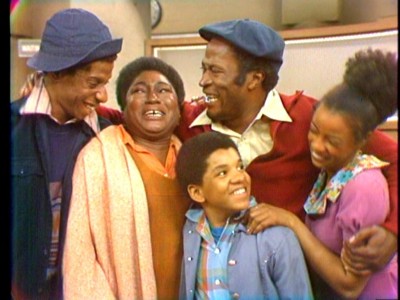
Created by writer Eric Monte and actor Michael Evans (who played the first - and best - Lionel Jefferson on All in the Family), Good Times proved to be an immediate smash hit with audiences. Even with a limited number of episodes airing during its initial half-season, it wound up in the Nielsen Top Twenty, before landing solidly in the Top Ten during its first full (actually second) season. Audiences didn't seem to mind the reboot of the Florida character, probably because Good Times' storyline seemed perfectly in synch with the times, then. Not only were African-American performers, writers, and directors enjoying a surge of popularity with producers in Hollywood and the "Big Three" networks at that time, the very recent seismic troubles with Nixon's Watergate, the tentative, ineffectual holding-pattern of Ford's presidency, the harsh economic downturn that occurred during those mid-70s years, and the coming incompetency of Carter's single term in office, all contributed to a tense, uneasy feeling in the country that meshed perfectly with the Evanses' social and economic trials and tribulations. While white viewers may have been non-plussed by the obvious white race baiting (which was more pronounced during the beginning seasons), many viewers, regardless of race, understood the economic hardships the Evanses were going through, and sympathized (I remember watching this with the old man, who often referred to the Evanses - as well as any other poor TV family like the Waltons, as "well-off").
With Lear's trademark emphasis on topical social commentary-through-humor, complimented by his "house style" of claustrophobic, deliberately dull, washed out production design (along with the crudity of his video shooting schematic), Good Times created a "bunker" mentality with the Evanses that American TV audiences immediately identified with, week after week. The overriding central theme was simple, constant, and oppressive: would the Evanses survive another week in the projects? If the economics of the American landscape (logically, though, the Chicago economy) didn't get them, would institutional racism, racism between cultures, racism within the black community, corrupt politics, the illegal or immoral temptations of ghetto life, or the very real physical dangers present in the projects, finally do them in as a family? Sticking almost exclusively to the drab, cinder block apartment for its action, Good Times reinforced this "bunker" hunkering down that drove the series' initial audience empathy. And by rigidly framing most episodes along the same story arc - a topical issue ignites controversy in the family; one of the family members is in danger of "succumbing" to that issue; the family rejects the "easy way" out of the issue; and despite not getting ahead, the family celebrates keeping their integrity - the producers and writers kept the series, at least in the first two seasons, remarkably focused. We the viewers could navigate the dizzying array of problems that Evanses encountered, while rooting for them to succeed.
Obviously, considering Good Times' Norman Lear origins, and the fact that this was the first network TV depiction of an African-American working class "nuclear family," race was a constant theme throughout its six seasons on the air. And as expected, whites were usually the brunt of the series' writers' jabs (at least in the beginning of the show). "Honkey" turns up a lot, as do Klan jokes, while the Michael character was a dependable source of racial one-liners designed to jolt the supposedly complacent audience. Any white viewer tuning into a Norman Lear-produced TV show in the early-to-mid 70s knew they were going to get skewered - liberal or conservative. But to the series' credit, Good Times was also hip to black stereotypes, prejudices, and preconceptions, as well, giving Good Times a margin of complexity in its design and execution that was also typical of early Lear productions. While obvious stereotypes are dealt with frequently, such as James' racist language including "nigger," "spooks," "Oreos," and "coon quota," and familiar black comedic clichés such as flim-flamming preachers (God's Business is Good Business), the comic-relief wino (Ned the wino, played by Sanford and Son's Raymond Allen, is seen semi-regularly), and various con artists and gamblers (Ron Glass has a nice bit as a blind confidence man in The Encyclopedia Hustle) often show up, more complex meditations on life within the black community also appear.
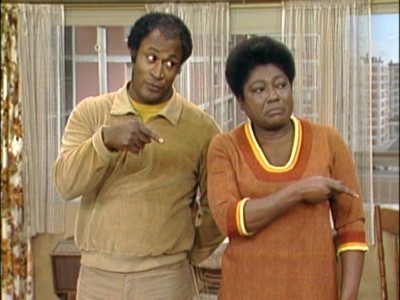
Frequently, tensions arise between James and Florida over James' perception that within a black household, the man has the final say, regardless of whether he's wrong or right - a view that always comes a cropper for James in the face of Florida's strong determination and common sense (Florida even jokes about her own cliché, the strong black woman holding the family together, which she says is perpetrated in all the magazines she reads, in the series' first episode, Getting Up the Rent). In Black Jesus, Florida is expected to reconcile her own history of growing up with a white portrait of Jesus, as opposed to the newly painted black one done by J.J. - with seemingly a run of good luck accompanying the arrival of the new painting. In Michael Gets Suspended, Michael doesn't get the support from his parents that he thought he would when he tells his teacher that George Washington was a racist. Florida defends Washington as a great man, and James threatens Michael with a whipping for being insolent in school. And in Crosstown Buses Run All Day, Doodah, Doodah, James cautions his family that they're coming up with the same excuses some whites have in opposition to busing - simple prejudice - instead of recognizing their own fears, a view born out by Michael's ultimately positive experience at an upscale, all-white school. With episodes such as those, it's clear that Good Times had more on its mind than just racial redress.
Good Times doesn't always have the time in its tight half-hour format to properly address these issues, though (which would prove to be a major drawback for the series as it progressed). While complex character motivations are embraced, follow-through is scant. In the two-parter, The Gang, James is bent on revenge for the gang leader who was arrested after wounding J.J.. But once outside the courtroom, after hearing the young man's mother cut him off from any further contact because of his long history of illegal activity, James feels sorry for the perpetrator. The episode doesn't become ridiculous, with James having an epiphany and inviting the kid over for dinner, but it is adept at putting out several conflicting issues that aren't easily reconciled. Unfortunately, episodes like The Gang don't crop up as often as they should in Good Times, with some troubling issues, such as corporal punishment and spousal abuse, appearing on a regular basis but with little or no satisfactory commentary. Throughout the series, it's played for laughs that James whips the kids with his belt (a notion that I'm sure quite a few people, regardless of their race or political persuasion, would find off-putting, and which certainly wouldn't fly in a TV sitcom today), while an episode like Florida Flips, where Florida slaps Michael in anger, is undercut by the numerous jokes that surround the women's support group that joke about their husbands slapping them around.
Quite often, that undercutting seriously affects Good Times's ability to go beyond its final label of well-meaning but ultimately slight sitcom. A good case in point is The Dinner Party, from season two, where the Evanses learn that one of their older neighbors has been reduced to eating dog food because of her finances. This potentially horrible and sad story is utterly reduced to farce when the Evanses invite the woman over for dinner...and she brings a meat loaf to say thank you. The Evanses of course suspect it's made of dog food, and a burlesque develops of people flying in and out of chairs, trying to stay clear of the loaf, while Willona even stoops to imitating a dog barking as she clears out of the apartment. Why in the world would the writers think it's funny to take such a potentially devastating subject, treat it initially with respect, only to trample it under crude farce at the end? Therein lies one of the central problems of not only Good Times, but also of Lear's socially relevant comedies: the message is often undercut by the requirements of the sitcom format. How does one shoehorn a not-at-all funny subject matter, with the purpose of "educating" the audience, when the delivery system itself - the sitcom - encourages a negating of that message? Good Times' politics may have been fuzzy on the best of days (if the show's "liberalism" is summed up by Florida holding a bat over a gang member's head while Michael beats the sh*t out of him, then send me an Obama bumper sticker, pronto), but it's hard to get across any message when the laugh track tells us something is funny when it's not, and when it lets us put uncomfortable messages, comfortably away.
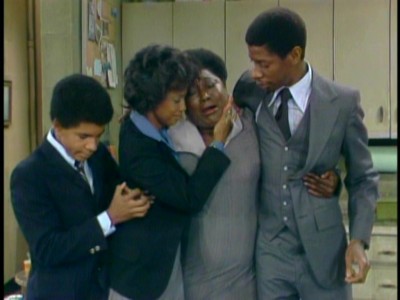
Of course, that's the fantasy element of Good Times: that it truly educates and therefore changes people's perceptions, and more importantly, their behavior. Despite getting kudos for introducing to America an element of society that was invisible on network TV prior to its premiere, Good Times, in its own way, is just as unrealistic as any other TV sitcom. Taking its cue from its largely whitewashed depiction of what life truly was like in the 1970s Cabrini-Green projects in Chicago (shots of which were used to establish the Evanses' home in the title and end credits), Good Times has the veneer of feel-good liberal "Lear-isms" that many viewers, by 1974, had become thoroughly used to, at least in terms of trying to raise their consciousnesses (if TV truly could do such a thing). Good Times came out a good three years after All in the Family, so its methodology wasn't unknown by the time it premiered. All of the familiar Lear tactics are on display, including the obvious "message" episodes that play like ABC After School Specials (I particularly love how a character always comes forward with a perfect Facts on File statistic to rattle off at a critical moment), the tentative applause that builds to a fade-out for each "important" scene, and the canned "whoas!" and "uh huhs!" and "yeahs!" and "that's right!" cat calls that litter the laugh track. At its most distinctive, the all-too-neat "wrap-up" of a complex social issue was a hallmark of Lear comedies, and Good Times suffers from that all too frequently. A good example is The Family Business, where James starts a small fix-it shop in the apartment. Mechanically inclined, he does quite well, getting more and more orders from the tenants who trust him with their appliances, but of course, something happens to scotch the whole deal (Bookman, who else), and there goes another of James' dreams. If that sounds like a flip description of the episode, that's exactly how it plays out, with a finale that's as abbreviated as it is meaningless. And when the family all sits around the table, laughing and joking about their failed venue (instead of cursing their unending bad luck and plotting the possible death of Bookman), the effect is one of forced gaiety and cheeriness that seems as unrealistic as Ozzie Nelson fumbling around his house all day, looking for something to do. Far too many Good Times episodes end this way, with a hot-button issue trotted out for effect, only to be neatly wrapped up and forgotten after 25 minutes. If the Evanses can laugh it off and forget it, why can't we?
Thank god, then, for J.J.. Although Rolle, and to a lesser extent Amos, actually went on record disparaging Walker's contributions to the show (Rolle specifically implicated "the performer" in her accusation against the show becoming racially insulting), it's very possible that had the J.J. character not "broken out" almost immediately, Good Times might not have had a five-and-a-half year run. You probably had to be there during the mid-1970s to appreciate the brief, mini-little pop culture explosion caused by Jimmie Walker's J.J. character. Certainly a kid favorite right before Fonzie knocked him off his TV throne, Walker probably couldn't have helped becoming an overnight sensation, because from the minute he walks on camera, you're already laughing. With his incredibly gangly, reed-thin body and his oversized, mugging features, Walker is a physical comedic prop funny enough to get laughs before he even delivers a line. And then when he does, he sells it straight to the audience like nobody's business (Walker frequently ignores the niceties of the inherent dramatics of the piece, and pitches directly to the camera and the viewer). Now, does that kind of delivery keep the integrity of a dramatic piece together? Of course not. But Walker never passed himself off as a serious actor (which probably started the serious Rolle and Amos off on the wrong foot right there), saying he was first and last a stand-up comedian who just happened to be appearing in a sitcom.
And again, thankfully, he's here, because otherwise, Good Times might have been deadly dull and even morose. According to all the stories, first Amos and then Rolle really did walk off the Good Times series because they were ticked off at the show being thrown to Walker's antics. And one can certainly see their point of view...to a point. The series was designed to be their showcase (they're the headliners, and Rolle was spun-off from Maude specifically with Good Times as her show), and almost immediately, all their good intentions get drowned out each and every week when the audience explodes into laughter when absolute novice Walker goes, "Kid ah-Dy-no-MITE!" (personally, I always preferred his hilariously long, drawn-out, "I knooooooowwwwww" - Eddie Murphy must have watched that bit very closely). That would kill any serious actor. But unlike good sport Ron Howard who soldiered on through several monotonous seasons of Happy Days, standing there off to the side while the Fonz stole away his series, Rolle and Amos couldn't take it, and they ankled the series. But there's no denying that the series' biggest laughs come from Walker (the rest of the cast, with the exception of the animated Du Bois and pro Amos, is surprisingly stiff in the out-and-out comedy bits), and, right or wrong, that tension between the serious intentions of the "grown-ups" in front of the camera, and the wide-mouthed clown who was ultimately supported by the producers and writers behind the scenes - and who wound up with the lion's share of the viewers' attentions, perfectly sums up Good Times' ultimately compromised status as a "meaningful" sitcom.
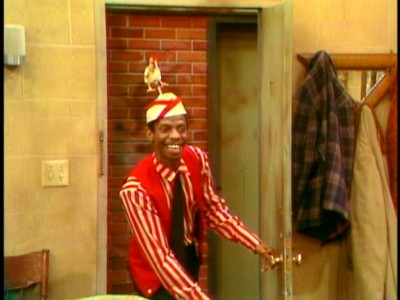
Rolle and Amos may have contended that Good Times abandoned "serious" issues when it started skewing towards the antics of J.J., but watching the progression of the show, that's obviously not correct. Serious subject matter never really left, but there's a whole lot more of J.J. on screen after the first season than there is Rolle and Amos, and that's probably where the rub lies. It's not surprising that CBS would ultimately "pick" Walker over Rolle and Amos, either, when faced with the obvious facts. The J.J. character was generating reams of publicity and viewer recognition; they would have been crazy to ignore him. TV, after all, is a business first, and an "artistic expression" second (or even third or fourth). With youth-oriented shows over on ABC increasingly supplanting the kind of adult-oriented, issue-driven sitcoms that Lear thrived on, it's a no-brainer that CBS would basically tell Amos and then Rolle, "take a hike if you don't like it." That doesn't mean, though, that Good Times got better when Amos was fired at the end of the third season. On the contrary, the show never really recovered from that loss of family feeling that it had successfully nurtured during its beginning run. With the strong presence of Amos gone, not only was the thematic element of Good Times gutted - a mother and a father trying to raise a family in almost impossible conditions - J.J.'s best foil, the threatening Amos, left Walker with less to bounce off of with his outrageously broad one-liners.
And as the reality of Amos' loss to the show sunk in, Good Times' aesthetic spiral began (even though the ratings had already started to dramatically sink before Amos' departure). When Good Times settled into its first full season on Tuesday nights at 8:00pm, opposite equally popular ABC family comedy, Happy Days (which had charted 16th for the previous 1973-1974 season), Good Times almost delivered Richie and Potsie into Cancellation-Land, knocking it out of the Nielsen Top Thirty while it landed an astounding seventh for the year. Conventional wisdom for Good Times' dramatic drop in ratings for its third and subsequent seasons has always been that it was "moved around too much" by CBS - which was true, but that didn't explain Good Times huge tumble to 24th for the year, where it remained programmed opposite Happy Days on Tuesdays at 8pm (Happy Days vaulted back to 11th for the season, riding the whole Fonzie craze). Nor did the departure of Amos, who wouldn't leave until the beginning of the fourth season. What no one ever suggests is that Good Times, for all its well-meaning intentions, just wasn't that strong enough of a show overall to support the initial J.J. craze that propelled the series into Top Ten status.
As the show wore on, and J.J.'s antics, funny as they were at first, became more outsized and at the same time, rote (the chicken hat that J.J. has to wear evidently was a deal-breaker for both Amos and Rolle), and as the parents left, one by one, Good Times became just another marginal sitcom, with whatever novelty it had on first viewing, long gone. The producers must have sensed this as well, toning down the ghetto-specific plots in favor of more generic (and inane) sitcom plots (the opening credits also abandoned the depressing shots of Chicago's crumbling projects, focusing on clips of the cast having silly fun). With James gone, Florida was left alone, but instead of showing her coping with the kids as an independent woman, the producers soon hooked her up with another man, the grumbling atheist Carl, played badly by Moses Gunn - a character that doesn't fit at all in the Good Times schematic. That development was enough for Rolle to call it quits at the end of the fourth season (which fell another two slots to 26th for the year), with the kids squarely in charge for the lame fifth season. Willona was there to look in on the kids every now and then - while scoring her own hefty subplot of adopting little Penny (Janet Jackson), a horrifically abused child (her mother beats her and burns her with an iron) who's introduced to kill two birds with one stone: to get a new younger kid into the Good Times mix, and to exploit one of the few social ills the series hadn't touched yet (although no one seemed to question those belt-whippings by James...). Anyone tuning into those developments must have absolutely fled to the relatively sedate, safe, suburban dramatics over on ABC's Eight is Enough (12th for the year), opposite Good Times in the fall of 1977. The kids were now in charge of the Evans home, and soon J.J. was buying a car with his friends (wasn't that an old Happy Days plot?), jawing on a CB (???), and squabbling with Bookman, who shows up in one scene in an old nightshirt and nightcap, for god's sake (this is the ghetto?). Audiences knew none of this was working, with ratings dropping precipitously to 39th for the 1977-1978 season.
In an obvious hail-Mary pass to save the series, Rolle was brought back for the sixth and final season, with the promise to get Good Times back onto more familiar ground. And that, of course, entailed making the family relatively poor again. Critics often criticize the stereotypical aspects of the J.J. character, but it's curious that no one ever mentions the producers' (and evidently, Rolle's) curious liberal conceit that demanded the Evans family become poor again to become more "real" and "honest" and more "authentically black." Before she came back, J.J., Thelma and Michael seemed to be achieving some kind of financial stability. But the minute Florida knocked on the door, gone was J.J.s successful job, with financial worries again besetting the Evans' household. Making matters even worse, the writers refused to explain Florida's return, totally wiping out the Carl character, and thus any rational explanation for Florida's year-long disappearance. Audiences have always been far smarter than TV producers and writers have ever given them credit for, and this lazy decision is a prime example of that arrogance. After that cop-out, the viewers were through with the Evanses, relegating the series to a pathetic 45th for the final 1978-1979 season. Not leaving well enough alone, the writers concocted a final fantasy for the Evanses, having the final episode arbitrarily grant every member of the Evans' household their dream come true: J.J. becomes a comic book artist; Florida moves in with Thelma, who's pregnant with her husband Keith's baby; Keith (Ben Powers), an exceedingly lame addition to the cast, miraculously heals his knee and signs with the Chicago Bears; Willona gets a promotion and moves in below Thelma; and Michael gets his own place. The abrupt, disquieting freeze frame of Willona hugging Florida, a storyline deus ex machina straight out of Hollywood, is emblematic of far too much of Good Times after its second season: facile, ill-conceived, compromised.
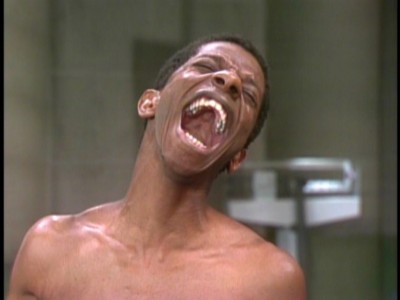
The DVD:
The Video:
You're not going to find a whole lot to be pleased with in Good Times: The Complete Series, as far as the full-screen, 1.33:1 transfers presented here. Lear's "house style" was, to be polite, fairly grungy, so expect crappy video, muted, muddy colors, and a fuzzy, soft picture that might make you reach for those rabbit ears (ask your Gramps, kid). But those of us who grew up on 1970s TV, this is a trip down memory lane: Good Times needs to look junky.
The Audio:
The Dolby Digital English mono audio tracks accurately reflect the original broadcast presentations. They're acceptable, but if you're used to today's digital fidelity, don't freak out when you hear all those studio mic anomalies. Close-captions are available for all six seasons.
The Extras:
The only extra here for Good Times: The Complete Series is the price (this is a good place to discuss the packaging). At a suggested retail price of $59.99 (and I see it's currently going for about $43 bucks at most on-line retailers), you simply can not beat this deal. However - and this a biggie - there's a reason for that price. Sony has packaged Good Times: The Complete Series in one of the most embarrassingly flimsy, potentially dangerous (to the discs) get-ups I've ever seen for a DVD release. All seventeen discs come stacked on one single plastic spindle (molded onto an ultra-thin plastic form that fits into the outer DVD box), with a rough corrugated cardboard insert used to hold the whole stack in place. So if you want to pull out disc three from season five, you have to pull out all of the discs that are stacked right on top of each other (hello scratches) to get at it. The cardboard DVD box holder approximates the size of a two-hardcase boxed set, so shelf-space is greatly reduced - along with the safety of the discs. An episode list is included, but no synopses, so if you don't remember what Love Has a Spot on Its Lung is about (hands down one of the most grotesque episode titles I've ever had the privilege of typing), then you better get online. I can see hard-core DVD fans being outraged by this packaging, as well as previous buyers of the individual seasons getting ticked off at the greatly reduced price here for the entire series. However, you lucky few who don't already own any of the discs here, and who are...cheap, will absolutely love this slashed-to-the-bone presentation.
Final Thoughts:
Good Times was Norman Lear at his most earnest...and most compromised. While the series was remarkably focused when it stuck to the Evanses trying to survive powerful economic and social forces (while maintaining a loving family), the show inevitably lost track when breakout star Jimmie Walker started screaming "Kid a-Dy-no-MITE!" every two seconds. No one can blame CBS and Walker, though, for running with the character...particularly when that character was the only bright light of energy and genuine humor in the show (and when Walker was so good at doing what he did best). As the parents peeled off, and the stories became progressively sillier, the social issues brought to light became cheapened by the hackneyed sitcom format, ironically leaving the viewer with J.J.'s mugging as the strongest element of the series. Anyone growing up during the 70s probably remembers Good Times fondly, and from a nostalgia standpoint, you can't go wrong with the ridiculously cheap Good Times: The Complete Series. And for about the first third of the series, Good Times was indeed, very, very good times. But only diehard J.J. fans will wade through the rest. Still, at about .33 cents an episode, who's going to say "no" to Good Times: The Complete Series. I recommend Good Times: The Complete Series.
Paul Mavis is an internationally published film and television historian, a member of the Online Film Critics Society, and the author of The Espionage Filmography.


|
| Popular Reviews |
| Sponsored Links |
|
|
| Sponsored Links |
|
|
| Release List | Reviews | Shop | Newsletter | Forum | DVD Giveaways | Blu-Ray | Advertise |
|
Copyright 2024 DVDTalk.com All Rights Reserved. Legal Info, Privacy Policy, Terms of Use,
Manage Preferences,
Your Privacy Choices | |||||||









